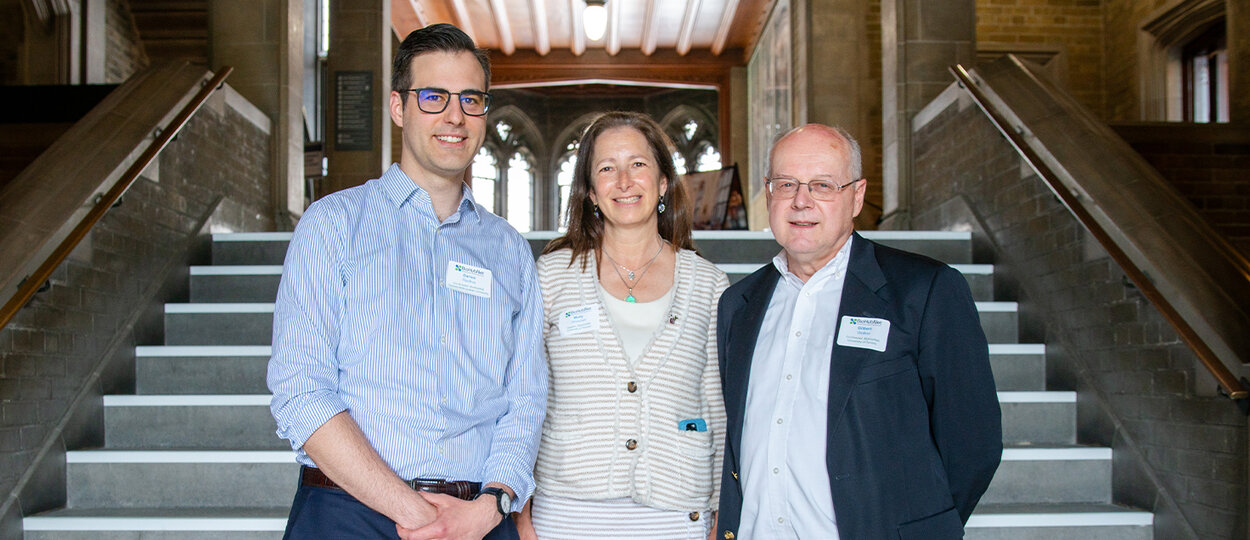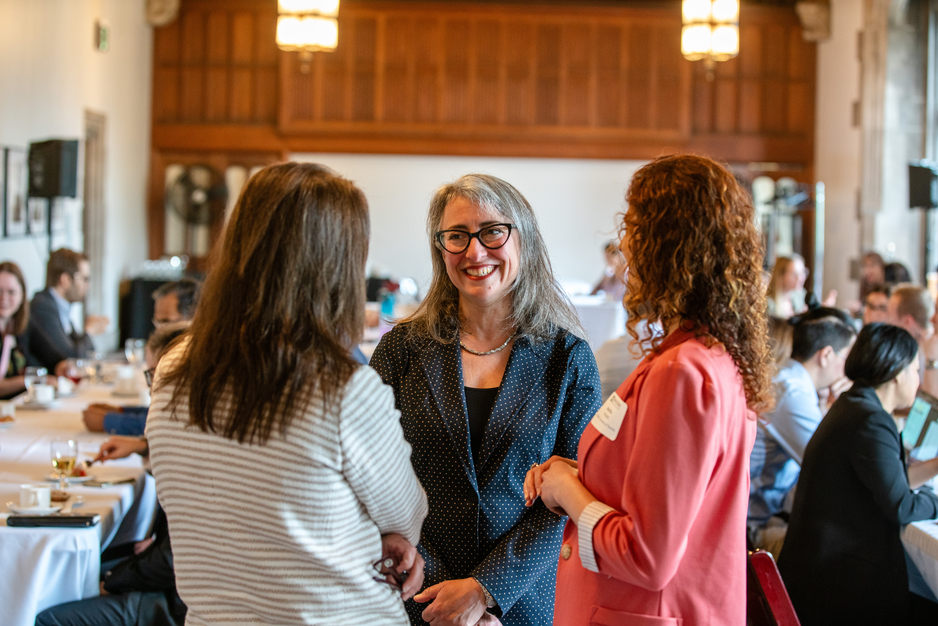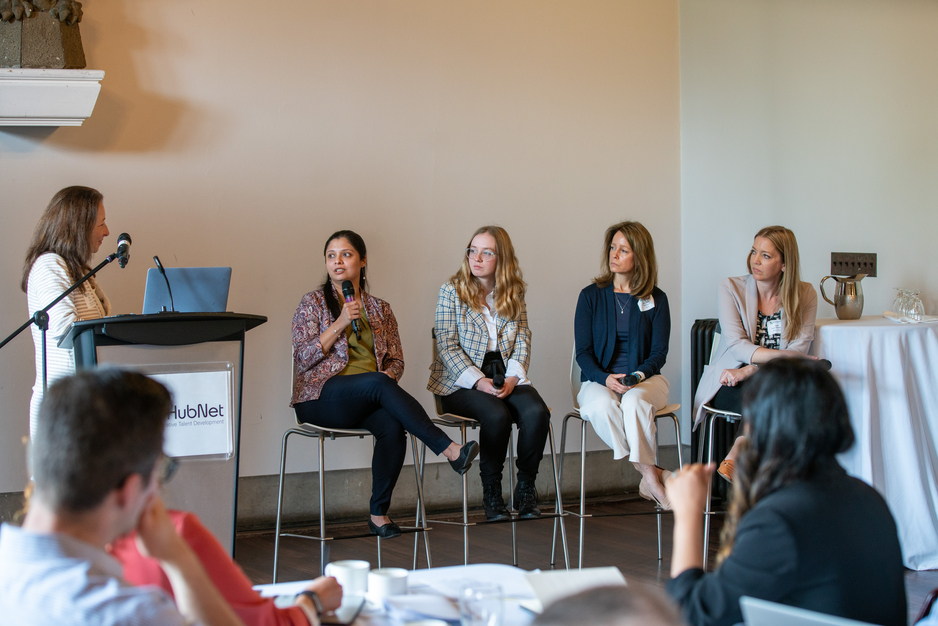University Professor Molly Shoichet (center), Pamela & Paul Austin Chair in Precision & Regenerative Medicine, with Darius Rackus (left), assistant professor of chemistry and biology at Toronto Metropolitan University, and Gilbert Walker, professor of chemistry at U of T.
The health of Canada's biomanufacturing and life sciences ecosystem relies on a highly skilled workforce. And yet, Canada is forecasted to need more skilled workers in this vital sector.
The newly launched Biomanufacturing Hub Network (BioHubNet), an immersive talent development program hosted at the Leslie Dan Faculty of Pharmacy at U of T and led by University Professor, Pamela & Paul Austin Chair in Precision & Regenerative Medicine Molly Shoichet, aims to bolster Canada's talent pipeline by bridging gaps between academia and industry to develop industry-ready talent for the biomanufacturing sector. Recently awarded $18.9 million in federal funding from the Canada Biomedical Research Fund (CBRF), BioHubNet is co-led by Darius Rackus, an assistant professor of chemistry and biology at Toronto Metropolitan University, and Gilbert Walker, professor of chemistry at U of T.
To kick off this exciting new initiative, BioHubNet partners and collaborators from across academia, the Toronto Academic Health Science Network (TAHSN) hospitals, partnering organizations and industry came together at U of T's Hart House to discuss pressing challenges and gaps faced by Canada's biomanufacturing sector.
“Our goal is to bring people together and kick-off BioHubNet with dialogue, listening and engagement, to hear what is needed to get trainees ready for careers in industry, and discuss the many partnership opportunities across the breadth of biomanufacturing from target identification to clinical management.”
“Our goal is to bring people together and kick-off BioHubNet with dialogue, listening and engagement, to hear what is needed to get trainees ready for careers in industry, and discuss the many partnership opportunities across the breadth of biomanufacturing from target identification to clinical management,” said Shoichet.
The sweeping network brings together eight universities and colleges, four hospitals, and 26 industry and training partners across Canada. Over the next four years, BioHubNet will support nearly 1,000 highly skilled workers across Canada through micro-credential courses, industry internships, academic exchange placements, and entrepreneurial training.
“BioHubNet will accelerate the translation of promising discoveries from bench to market and ensure that this country's biomanufacturing sector continues to grow and attract further international investment,” said Leah Cowen, professor and vice-president, research & innovation and strategic initiatives at U of T, who provided opening remarks at the event. “BioHubNet's work will operationalize Canada's Biomanufacturing and Life Sciences Strategy that aims to grow a strong, competitive domestic life sciences sector with cutting-edge biomanufacturing capabilities and to improve national pandemic preparedness.”
Connecting and preparing graduate trainees for industry
Strengthening the national talent pipeline means developing new and innovative training opportunities so graduates from universities and colleges entering the workforce have a more defined and industry-ready skillset.
“Currently, much of our work is focused on experiments and research, but we don't always think as much from a product perspective, or if our research is directly applicable or scalable to solve a real-world problem,” said Madhuja Chakraborty, University of Waterloo, PhD student and member of the Aucoin Research Group that focuses on complex biologics. “It's important to consider these areas more and include them in academic biomanufacturing training programs to move from lab skills to industry skills.”
A common goal to expand Canada's talent pipeline
Canada is a recognized global leader in health research and has a rich history of developing medical breakthroughs. However, the biomanufacturing and life science sector faces a critical shortage of highly-skilled workers despite the country’s educated population. Ensuring a smooth transition of highly qualified personnel (HQP) from academia to industry is vital for Canada’s economic growth and is the core mission of BioHubNet.
“The Ontario Bioscience Innovation Organization (OBIO®) supports the commercialization of early-stage and venture backed companies and entrepreneurship training is a big piece of our work. We applaud the federal government in supporting the training of highly-qualified personnel (HQP) and entrepreneurs in the biomanufacturing sector to increase our domestic capacity to deal with for future pandemics and infectious health threats,” said Dr. Maura Campbell, President and CEO of OBIO®. “We are excited to be a delivery partner with BioHubNet to provide experiential learning for HQP and entrepreneurs by drawing on OBIO®’s well-established programming in skills development and training for life sciences.”
Strategic partnerships between academia, industry, and commercialization and entrepreneurship support organizations are essential to expand Canada’s talent pipeline.
“Seeing all of the many training partners from the academic world to local and global industry to commercialization support organizations such as ours come together for the common goal of expanding Canada's life sciences and biomanufacturing talent pipeline was truly inspiring,” said Parimal Nathwani, President and CEO of Toronto Innovation Acceleration Partners (TIAP).
“It's only through this type of collaboration and alignment that we'll be successful in realizing the full opportunity before us.”
More News
Image

PharmD student receives Volunteer Award from Life Sciences Ontario
Simonne Rauch is recognized for her contributions to ambassador and mentorship programs.
Read More
Image

Celebrating Excellence: Mike Folinas Receives 2024-25 Exemplary U of T Ambassador Award
Mike Folinas has received the 2024–25 Exemplary U of T Ambassador Award for his outstanding service and leadership in supporting the academic community.
Read More
Image

Structural biology research takes aim at rare neurodegenerative disease
Rachel Harding leads research to understand protein responsible for Huntington’s disease and advance drug discovery
Read More


